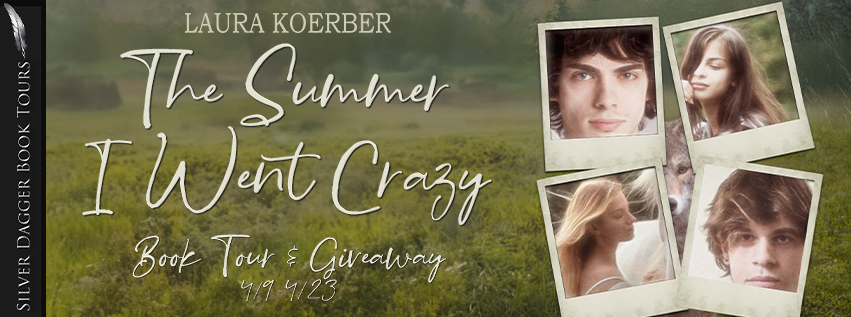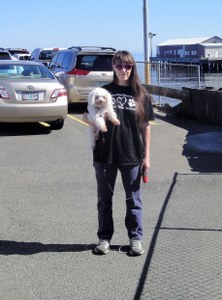The Summer I Went Crazy :Coming of Age, YA Literary Fiction by Laura Koerber ➱ Book Tour with Guest Post and giveaway
The summer I went crazy happened forty years ago when I was just seventeen, but I've never forgotten.
It started with rape and ended with a promise. In between I fell in love, broke the law, and made an irrevocable decision.
The Summer I Went Crazy
by Laura Koerber
Genre: Coming of Age, YA Literary Fiction
The rule for guys like me was that we'd grow up to be like our parents. Our parents put a lot of work and money into making sure we did. I got it all: the expensive private school education, the summers in Europe, the family connections to a congressman and other influential people, an admission to Yale. I was fast tracked for success.
Instead, I became the witness to a rape.
And I fell in love, broke a bunch of laws, made an irrevocable decision, and made a lifetime promise.
And
now, forty years later, I am making a phone call.
The Year
I Went Crazy is a rewrite of an earlier novel, Coyote Summer. The
plot is much the same, but Coyote Summer is a magical realism novel
with a fantasy element, while The Summer I Went Crazy is straight
realistic literary fiction about coming of age.
**TRIGGER WARNING – While not containing the direct decription of rape, it does describe dealing with the aftermath of rape and includes drug and alcohol abuse.
Epilogue:
Utah 2019
Her
phone is ringing. I’m using the land line because the call is too important for
a cell phone. I can’t risk the hassles: static, weak sound, or a dropped call.
My voice has to reach across the Rocky Mountains, across the Great Plains, and
all the way to Wisconsin. And it has to reach across nearly forty years and who
knows what changes and pain as well. She never got married. Does that mean
anything? Girls who went to Saint Anne’s were brought up to get married.
Just like the boys
who went to St. Andrew’s were supposed to grow up to be captains of business or
leaders of the people— like my old buddy, Clint, now known as Congressman
Welch. Claire, Clint, and I had been private school kids, brought up with the
belief that we were entitled to turn our expensive educations into prestigious
positions in society.
Well, Clint had
done that by winning his dad’s seat in Congress. I didn’t know anything about
Claire except she’d never married, and she still lived in Camden. Right there
in Clint’s district.
She must be scared.
Ring, ring, ring.
Is she standing by the phone, afraid to answer?
I’d phoned her once
before, but it was a long, long time ago, a painful conversation between
strangers that I still remember with humiliation. I’m expecting this call to be
painful too. Ring, ring.
Maybe she isn’t
home. Or maybe she’s letting her message machine take the calls. That seems
likely, come to think of it. She’s probably been getting harassing calls.
Christ, harassing calls! At least mine isn’t one of those. Please answer.
Please. Ring, ring.
She isn’t
answering. Well, I can understand that. So I need to say something to her
message machine, something that will remind her without scaring her. Maybe just
tell her my name and hope—
“Hello?” Suddenly
her voice. Tentative, as she’d been the last time. I’m so startled that I
gibber incoherently, “Claire? Claire? It’s Benny. I’m Benny?”
Silence. I can hear
her breathing. “Claire?” I try again, afraid that she might hang up. “Do you
remember me? Benny from high school. I
made a promise to you?”
She starts to cry.
Chapter One: The Party, June, 1983
The rule was that
Camden girls were all dogs. That’s what all the St. Andrew’s guys said. It
wasn’t true; some, maybe even most, were pretty, but the guys joked about what
dogs they were anyway. Camden girls went to public school, so they had to be
dogs.
We were all real
studs, of course. Healthy in body and mind: athletic, scholarly, regular
attendees at church, destined to be lawyers or CEOs or Congressmen. Or maybe
doctors but not family practice. Some high paying specialty. We were going to
pick up wives along the way from the stock available at an Ivy League college
or a country club or something like that. And our wives would be pretty. At
least for the first couple of years.
We were going grow
up to be our parents. That was another rule.
So I kind of
wondered why I was checking myself out so carefully in the mirror. My hair was
combed, I had no obvious zits, and I’d applied deodorant. I looked like a prep
school kid. I liked looking like a prep school kid because I was
a prep school kid, but something was bugging me.
I wasn’t very tall.
Maybe that was it.
Clint banged on my
bedroom door, two thumps, like a code. He didn’t say anything. I grabbed my
monogrammed leather jacket, a gift from my big sister. Her idea of macho, I
think, intended to make me more impressive to the female gender. I slapped my
butt to make one last wallet check. As long as I had my wallet, nothing could
go too badly wrong.
Clint was sashaying
down the hall like he lived in my house. Well, he’d been my best friend
forever, and we were always running in and out of each other’s houses. I could
tell by his loping, lopsided stride that he was drunk already. Him first, me
behind, we galloped down the stairs.
On the way to the door, we passed the archway
to the main living room, the big room at the front of the house. Neither of my
parents was in there which meant they were down the hall in the den or the TV
room. I leaned around the door and hollered, “Hey, I’m off!” From the depths of
the house, my mom shouted back, “Have fun!” Clint and I were on our way to a
party. Not a party with anyone I would know. Someone had invited Clint, and
Clint had invited the rest of us.
By “us” I mean me,
Marty, and Rob. They were waiting in Clint’s car, having started the party off
up in Clint’s room at his house with some hard liquor. I clambered into the
nearly vestigial back seat, bumped shoulders with Rob, and got a nose full of
his aftershave. Clint stomped on the gas, and we launched ourselves upon the
world with a roar from the engine of his bright red Mustang.
I watched the big houses of our neighborhood
flash by and morph into the brick store fronts of downtown Camden. The streets
were wet and smeared with the colors of the streetlights and neon. Clint
charged the yellow traffic lights and bullied his way through the bar crowd
traffic. Once he got past downtown, he rammed the gas pedal down and we roared
through a neighborhood of little white cottages, acres of them—student housing
for the state university. I knew a grad of our school who lived somewhere out
there in Outer Slobovia. He said he wanted to be a veterinarian, but really he
just didn’t get very good grades at our school, so he had to go to a state U.
We passed knots of students standing at the corners or walking around. Marty
hollered out the window at them just to be obnoxious. One group responded with
peace signs, and I saw a hand raised with a joint.
“Hey, they have
some pot,” Marty yelled over the radio.
“What?” Clint yelled back.
“Those townies were going to give us some pot.”
“Plenty where we’re headed.”
We flew down the
long slant to the river, accelerated across the bridge, and shot up the hill on
the other side into the alien world of rural Wisconsin. Dairy farms. Or some
other kinds of farms. Farms anyway. I was from Camden, but I didn’t know
anything about farms except the obvious: They were spaced at regular intervals;
each had a very, very bright light attached to the barn; and they were fenced.
Because of cows, I assumed.
We hurtled through
the darkness. Clint always drove like a fighter pilot, swooping and swerving.
He got very relaxed and fluid when drunk, and I actually was not afraid he’d
kill us. I just rolled around with the turns, first me leaning into Rob, then
Rob leaning into me. Then Clint braked abruptly, aimed the car between fence
posts, and we bounced up a dirt road to a yard packed with cars parked every
which way around a shabby farm house.
I could tell right
away that most of the kids were not from our school because the pickup trucks
and cars looked like they belonged to somebody's mom or dad. Clint braked with
a flourish, and the red Mustang came to a quivering halt, exhaling steam into the
cool night air. We all disentangled ourselves and climbed out.
I became a writer because I stole a dog.
I sneaked up a dirt road through a forest in the dark—it was
around three o'clock in the morning—with some wire cutters, a leash, and a bag
of fried chicken. The dog was kept confined in a chicken coop and was only
alive because I'd been making weekly nighttime visits with food and water for
over a year. The owner was mentally incompetent, and our local law enforcement
had refused to take action.
I took action when I discovered an underground railroad for
“midnight rescues.” I liberated the dog and got him on the railroad to an
out-of-state home.
I can tell you about this because enough years have passed
for the statute of limitations to be up. How did this experience transform me
into a writer? I wrote it up as a novella, published it, and won an award. That
set me off on a course of writing which includes two more award-winning books.
My complete list is here: Books by
Laura Koerber (Author of I Once Was Lost, But Now I'm Found) | Goodreads
My books tend to be
character-driven and often develop a theme related to the love of nature or
animals. Most of my novels are in the genre of magical realism and involve
nature spirits and life after death; however, I also have one non-fiction book
about an epic dog rescue that happened in Forks, WA. Yes, the Twilight town.
I've also authored a cozy murder story and a collection of realistic short
stories which includes the novella about stealing a dog.
I'm surprised to be a writer. I was precocious in art as a
kid, but never saw myself as being able to write a book until I wrote one. I've
always been a voracious reader of fantasy, science, history, and English murder
mysteries. I think I learned to write by reading a lot.
Best wishes to all of you readers and writers out there and
I hope you find a good book soon!
Laura is an artist who lives on an island with her husband and her two dogs. She has always entertained herself by telling herself stories. As a child, she used to like going to bed because she could lie awake under the covers and run movies in her head. Later, as an adult, she enjoyed long distance driving for the opportunity to spend hours writing novels in her imagination.
Now Laura divides her retirement time between dog rescue, care for disabled people, political activism, and yes, she still tells herself stories while she is driving. Her first book, The Dog Thief and Other Stories, written under the pen name of Jill Kearney, was listed by Kirkus Review as one of the One Hundred Best Indy Books of 2015. She's also the author of I Once Was Lost, But Now I'm Found, Limbo, The Eclipse Dancer, and Wild Hare. She has a story contribution in the book Rescue Smiles, too.
Facebook * Bookbub * Amazon * Goodreads
Follow the tour HERE for special content and a giveaway!
$10 Amazon











I'm looking forward to reading this coming of age story. Thanks for sharing.
ReplyDeleteThis sounds like a really cool read.
ReplyDelete